Analysis of Shareholder-Management Relationship and Earnings
VerifiedAdded on 2023/04/20
|12
|2734
|152
Report
AI Summary
This report delves into the critical relationship between shareholders and management, particularly concerning earnings management issues faced by organizations. The analysis incorporates the application of agency theory and positive accounting theory to explain the dynamics at play. The report highlights that the relationship between managers and shareholders is a complex one, often characterized by potential conflicts of interest. It examines how managers, as agents, might be incentivized to manage earnings to their advantage, while shareholders, as principals, seek transparency and accurate financial reporting. The study further explores how positive accounting theory helps to predict and explain accounting methods used by companies, focusing on relationships between individuals and how accounting supports these relationships. The report concludes by emphasizing the importance of audits and monitoring to mitigate the risks associated with earnings management and protect the interests of shareholders.
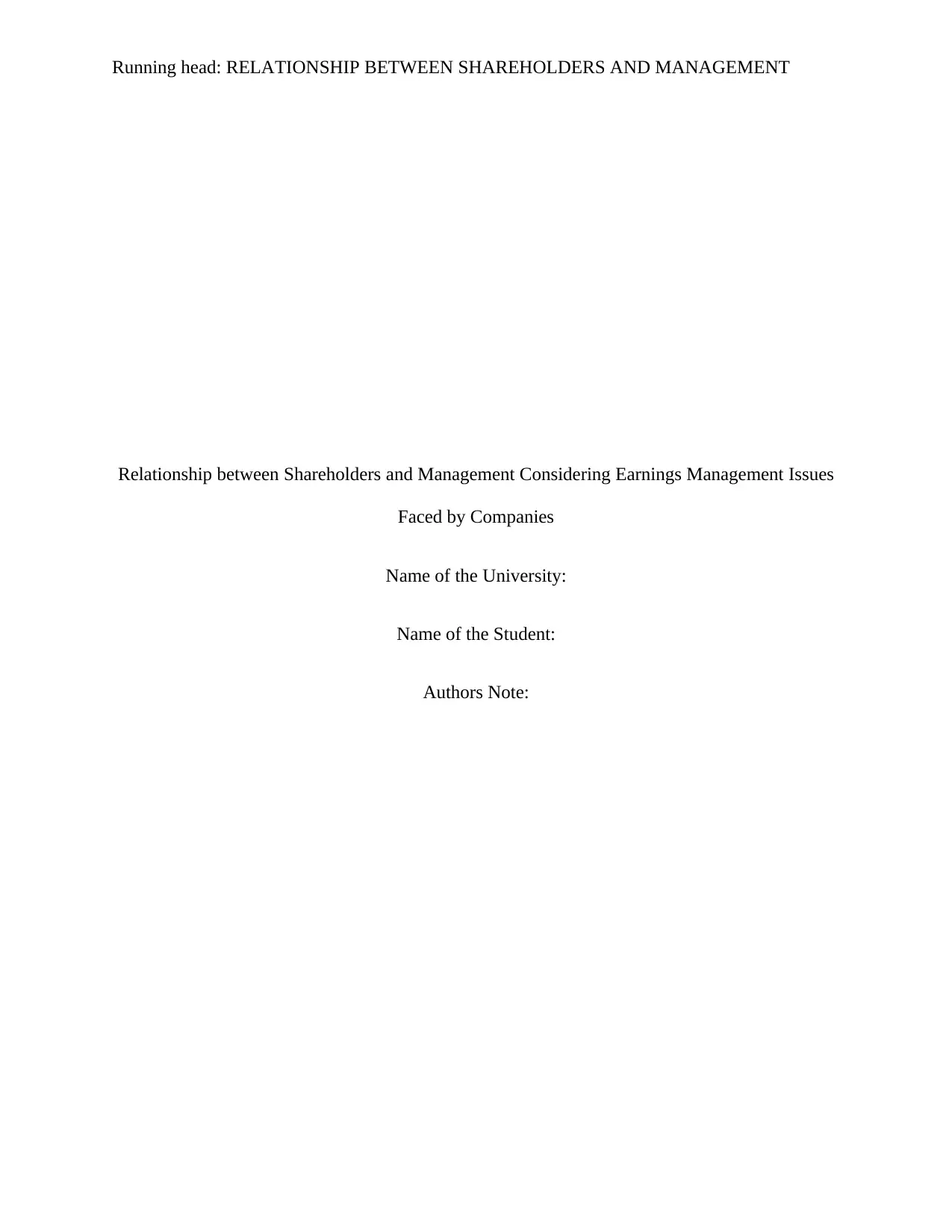
Running head: RELATIONSHIP BETWEEN SHAREHOLDERS AND MANAGEMENT
Relationship between Shareholders and Management Considering Earnings Management Issues
Faced by Companies
Name of the University:
Name of the Student:
Authors Note:
Relationship between Shareholders and Management Considering Earnings Management Issues
Faced by Companies
Name of the University:
Name of the Student:
Authors Note:
Paraphrase This Document
Need a fresh take? Get an instant paraphrase of this document with our AI Paraphraser
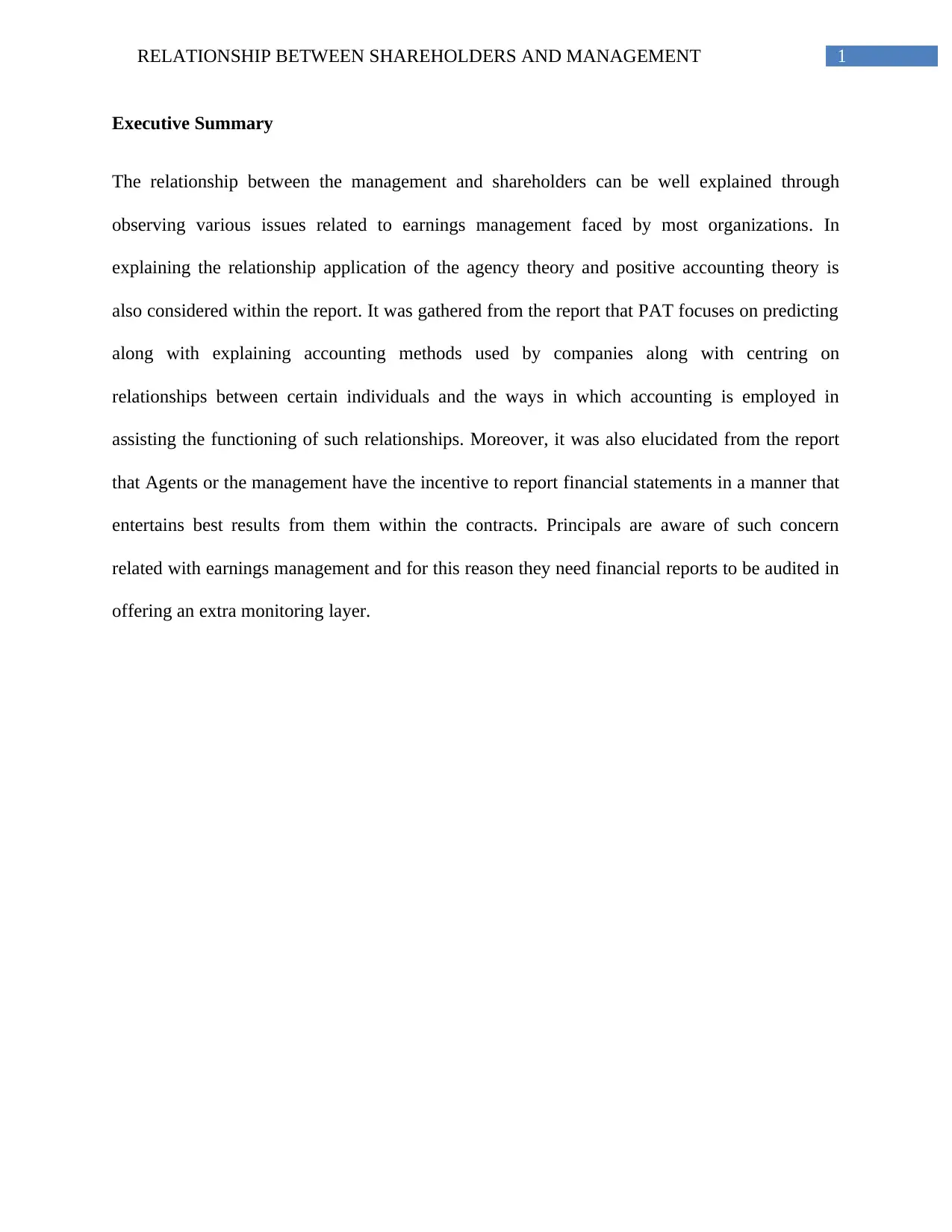
1RELATIONSHIP BETWEEN SHAREHOLDERS AND MANAGEMENT
Executive Summary
The relationship between the management and shareholders can be well explained through
observing various issues related to earnings management faced by most organizations. In
explaining the relationship application of the agency theory and positive accounting theory is
also considered within the report. It was gathered from the report that PAT focuses on predicting
along with explaining accounting methods used by companies along with centring on
relationships between certain individuals and the ways in which accounting is employed in
assisting the functioning of such relationships. Moreover, it was also elucidated from the report
that Agents or the management have the incentive to report financial statements in a manner that
entertains best results from them within the contracts. Principals are aware of such concern
related with earnings management and for this reason they need financial reports to be audited in
offering an extra monitoring layer.
Executive Summary
The relationship between the management and shareholders can be well explained through
observing various issues related to earnings management faced by most organizations. In
explaining the relationship application of the agency theory and positive accounting theory is
also considered within the report. It was gathered from the report that PAT focuses on predicting
along with explaining accounting methods used by companies along with centring on
relationships between certain individuals and the ways in which accounting is employed in
assisting the functioning of such relationships. Moreover, it was also elucidated from the report
that Agents or the management have the incentive to report financial statements in a manner that
entertains best results from them within the contracts. Principals are aware of such concern
related with earnings management and for this reason they need financial reports to be audited in
offering an extra monitoring layer.
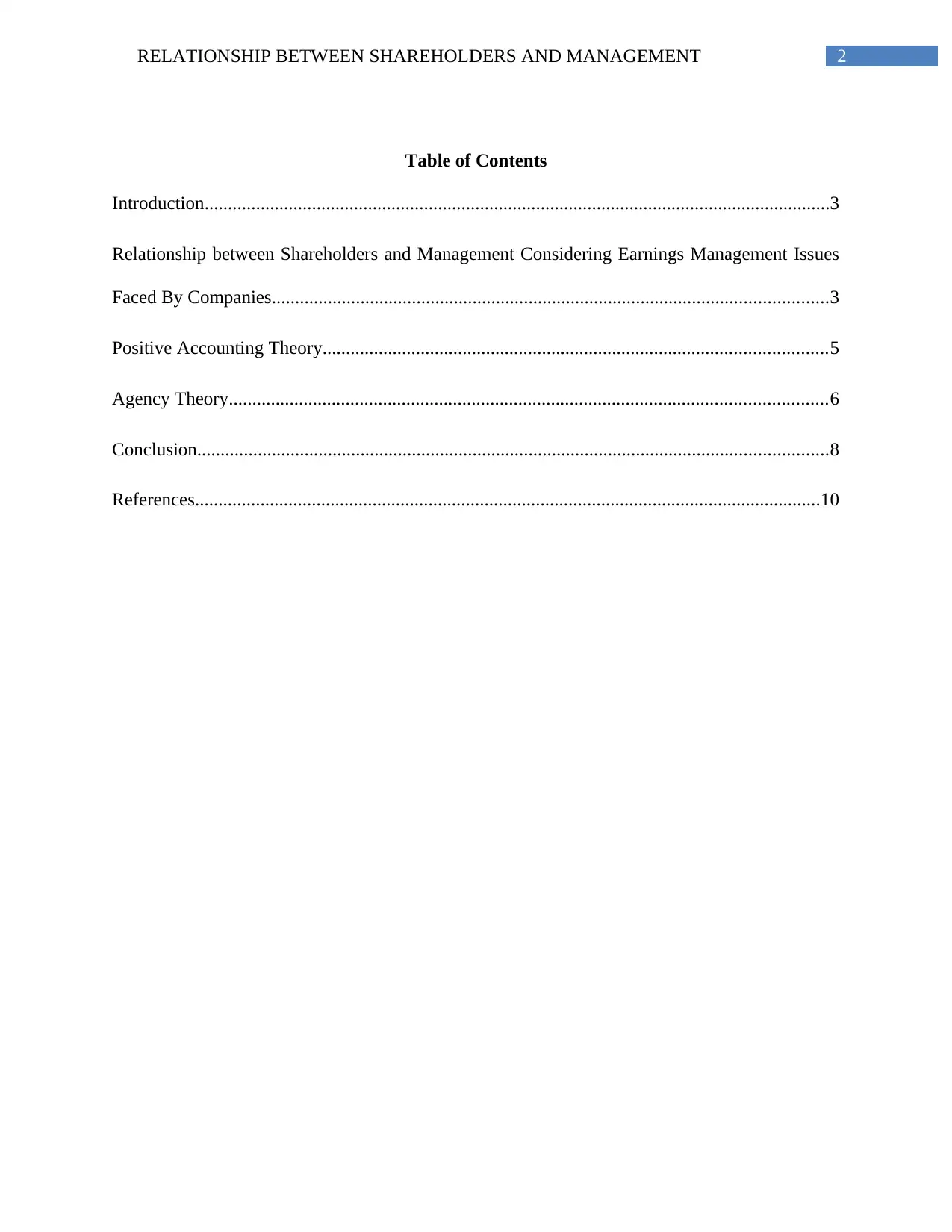
2RELATIONSHIP BETWEEN SHAREHOLDERS AND MANAGEMENT
Table of Contents
Introduction......................................................................................................................................3
Relationship between Shareholders and Management Considering Earnings Management Issues
Faced By Companies.......................................................................................................................3
Positive Accounting Theory............................................................................................................5
Agency Theory................................................................................................................................6
Conclusion.......................................................................................................................................8
References......................................................................................................................................10
Table of Contents
Introduction......................................................................................................................................3
Relationship between Shareholders and Management Considering Earnings Management Issues
Faced By Companies.......................................................................................................................3
Positive Accounting Theory............................................................................................................5
Agency Theory................................................................................................................................6
Conclusion.......................................................................................................................................8
References......................................................................................................................................10
⊘ This is a preview!⊘
Do you want full access?
Subscribe today to unlock all pages.

Trusted by 1+ million students worldwide
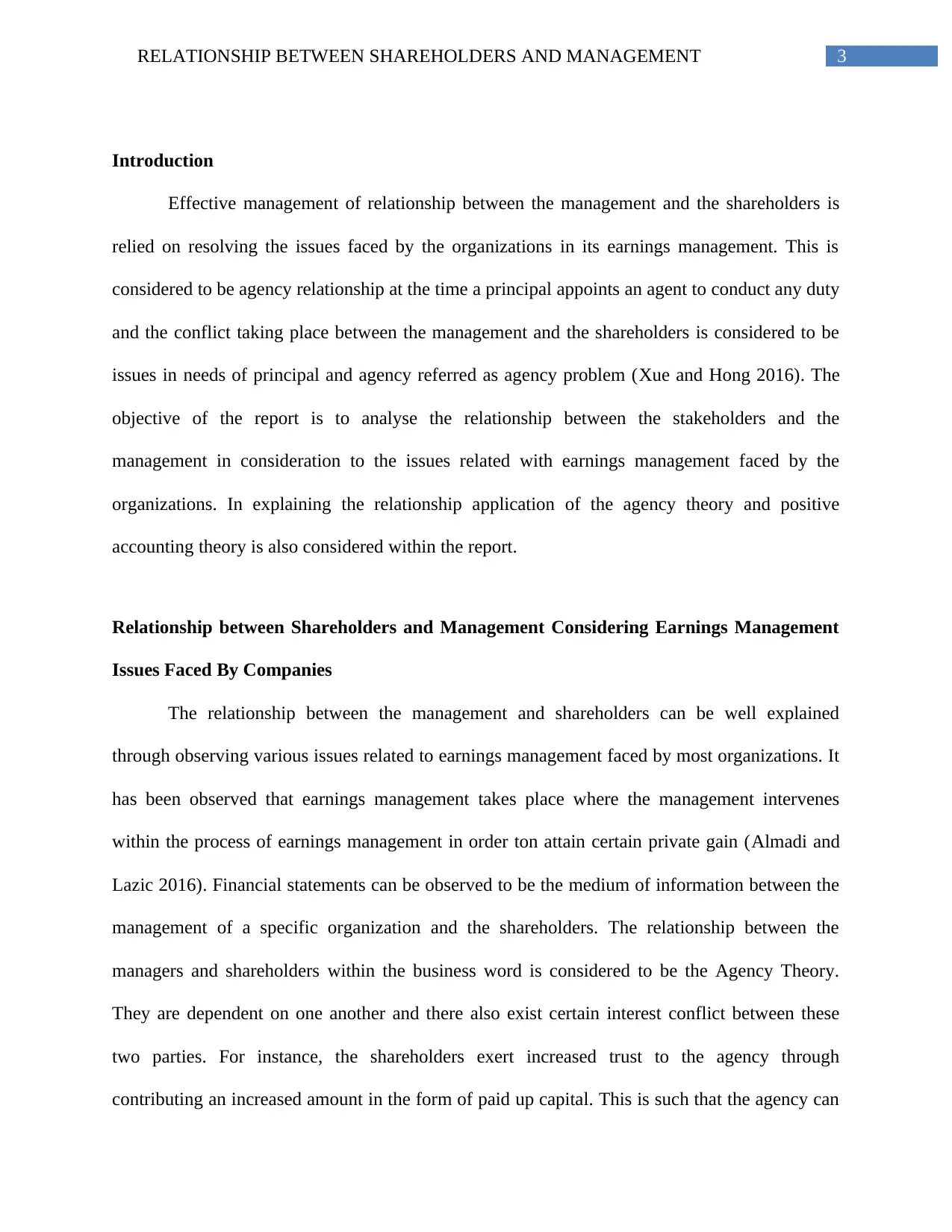
3RELATIONSHIP BETWEEN SHAREHOLDERS AND MANAGEMENT
Introduction
Effective management of relationship between the management and the shareholders is
relied on resolving the issues faced by the organizations in its earnings management. This is
considered to be agency relationship at the time a principal appoints an agent to conduct any duty
and the conflict taking place between the management and the shareholders is considered to be
issues in needs of principal and agency referred as agency problem (Xue and Hong 2016). The
objective of the report is to analyse the relationship between the stakeholders and the
management in consideration to the issues related with earnings management faced by the
organizations. In explaining the relationship application of the agency theory and positive
accounting theory is also considered within the report.
Relationship between Shareholders and Management Considering Earnings Management
Issues Faced By Companies
The relationship between the management and shareholders can be well explained
through observing various issues related to earnings management faced by most organizations. It
has been observed that earnings management takes place where the management intervenes
within the process of earnings management in order ton attain certain private gain (Almadi and
Lazic 2016). Financial statements can be observed to be the medium of information between the
management of a specific organization and the shareholders. The relationship between the
managers and shareholders within the business word is considered to be the Agency Theory.
They are dependent on one another and there also exist certain interest conflict between these
two parties. For instance, the shareholders exert increased trust to the agency through
contributing an increased amount in the form of paid up capital. This is such that the agency can
Introduction
Effective management of relationship between the management and the shareholders is
relied on resolving the issues faced by the organizations in its earnings management. This is
considered to be agency relationship at the time a principal appoints an agent to conduct any duty
and the conflict taking place between the management and the shareholders is considered to be
issues in needs of principal and agency referred as agency problem (Xue and Hong 2016). The
objective of the report is to analyse the relationship between the stakeholders and the
management in consideration to the issues related with earnings management faced by the
organizations. In explaining the relationship application of the agency theory and positive
accounting theory is also considered within the report.
Relationship between Shareholders and Management Considering Earnings Management
Issues Faced By Companies
The relationship between the management and shareholders can be well explained
through observing various issues related to earnings management faced by most organizations. It
has been observed that earnings management takes place where the management intervenes
within the process of earnings management in order ton attain certain private gain (Almadi and
Lazic 2016). Financial statements can be observed to be the medium of information between the
management of a specific organization and the shareholders. The relationship between the
managers and shareholders within the business word is considered to be the Agency Theory.
They are dependent on one another and there also exist certain interest conflict between these
two parties. For instance, the shareholders exert increased trust to the agency through
contributing an increased amount in the form of paid up capital. This is such that the agency can
Paraphrase This Document
Need a fresh take? Get an instant paraphrase of this document with our AI Paraphraser
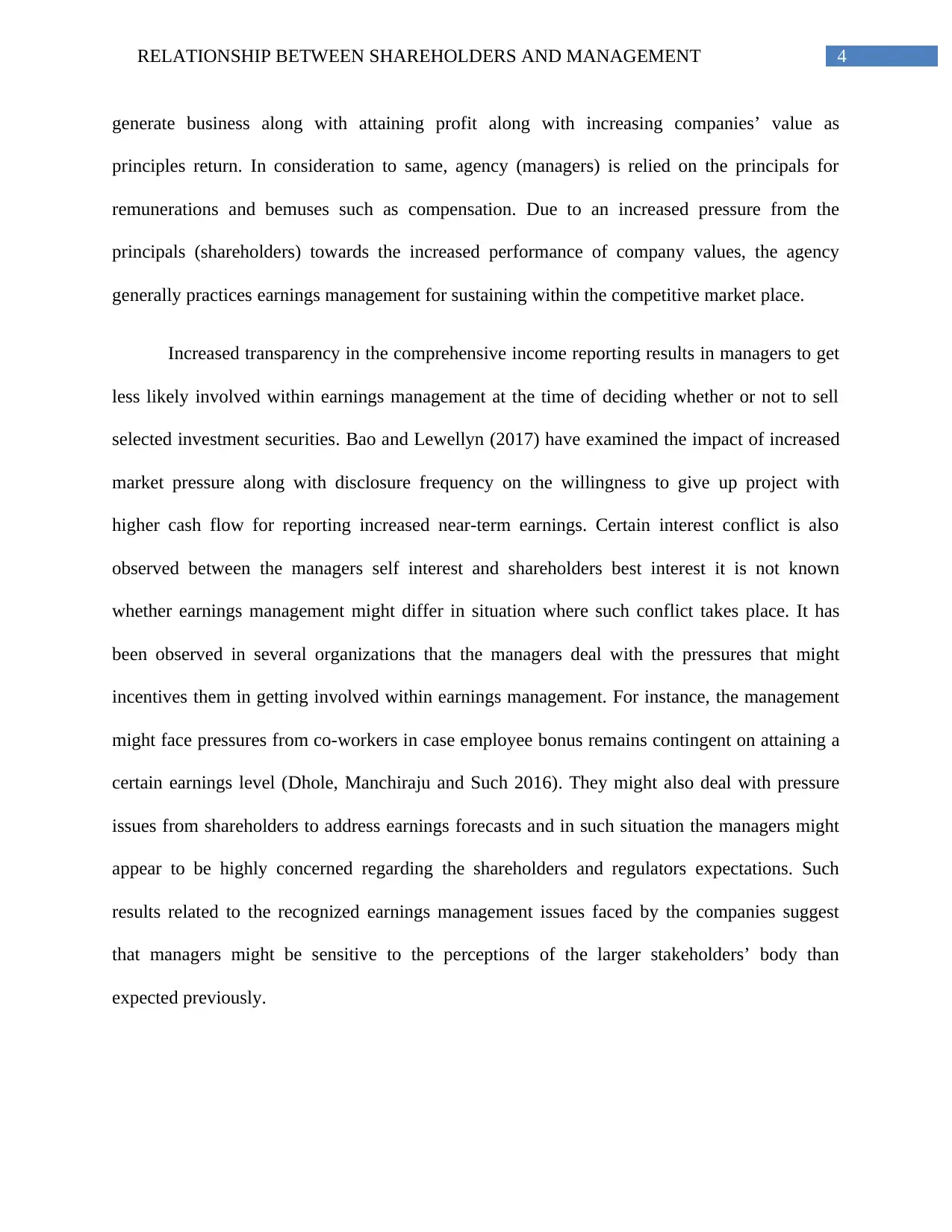
4RELATIONSHIP BETWEEN SHAREHOLDERS AND MANAGEMENT
generate business along with attaining profit along with increasing companies’ value as
principles return. In consideration to same, agency (managers) is relied on the principals for
remunerations and bemuses such as compensation. Due to an increased pressure from the
principals (shareholders) towards the increased performance of company values, the agency
generally practices earnings management for sustaining within the competitive market place.
Increased transparency in the comprehensive income reporting results in managers to get
less likely involved within earnings management at the time of deciding whether or not to sell
selected investment securities. Bao and Lewellyn (2017) have examined the impact of increased
market pressure along with disclosure frequency on the willingness to give up project with
higher cash flow for reporting increased near-term earnings. Certain interest conflict is also
observed between the managers self interest and shareholders best interest it is not known
whether earnings management might differ in situation where such conflict takes place. It has
been observed in several organizations that the managers deal with the pressures that might
incentives them in getting involved within earnings management. For instance, the management
might face pressures from co-workers in case employee bonus remains contingent on attaining a
certain earnings level (Dhole, Manchiraju and Such 2016). They might also deal with pressure
issues from shareholders to address earnings forecasts and in such situation the managers might
appear to be highly concerned regarding the shareholders and regulators expectations. Such
results related to the recognized earnings management issues faced by the companies suggest
that managers might be sensitive to the perceptions of the larger stakeholders’ body than
expected previously.
generate business along with attaining profit along with increasing companies’ value as
principles return. In consideration to same, agency (managers) is relied on the principals for
remunerations and bemuses such as compensation. Due to an increased pressure from the
principals (shareholders) towards the increased performance of company values, the agency
generally practices earnings management for sustaining within the competitive market place.
Increased transparency in the comprehensive income reporting results in managers to get
less likely involved within earnings management at the time of deciding whether or not to sell
selected investment securities. Bao and Lewellyn (2017) have examined the impact of increased
market pressure along with disclosure frequency on the willingness to give up project with
higher cash flow for reporting increased near-term earnings. Certain interest conflict is also
observed between the managers self interest and shareholders best interest it is not known
whether earnings management might differ in situation where such conflict takes place. It has
been observed in several organizations that the managers deal with the pressures that might
incentives them in getting involved within earnings management. For instance, the management
might face pressures from co-workers in case employee bonus remains contingent on attaining a
certain earnings level (Dhole, Manchiraju and Such 2016). They might also deal with pressure
issues from shareholders to address earnings forecasts and in such situation the managers might
appear to be highly concerned regarding the shareholders and regulators expectations. Such
results related to the recognized earnings management issues faced by the companies suggest
that managers might be sensitive to the perceptions of the larger stakeholders’ body than
expected previously.
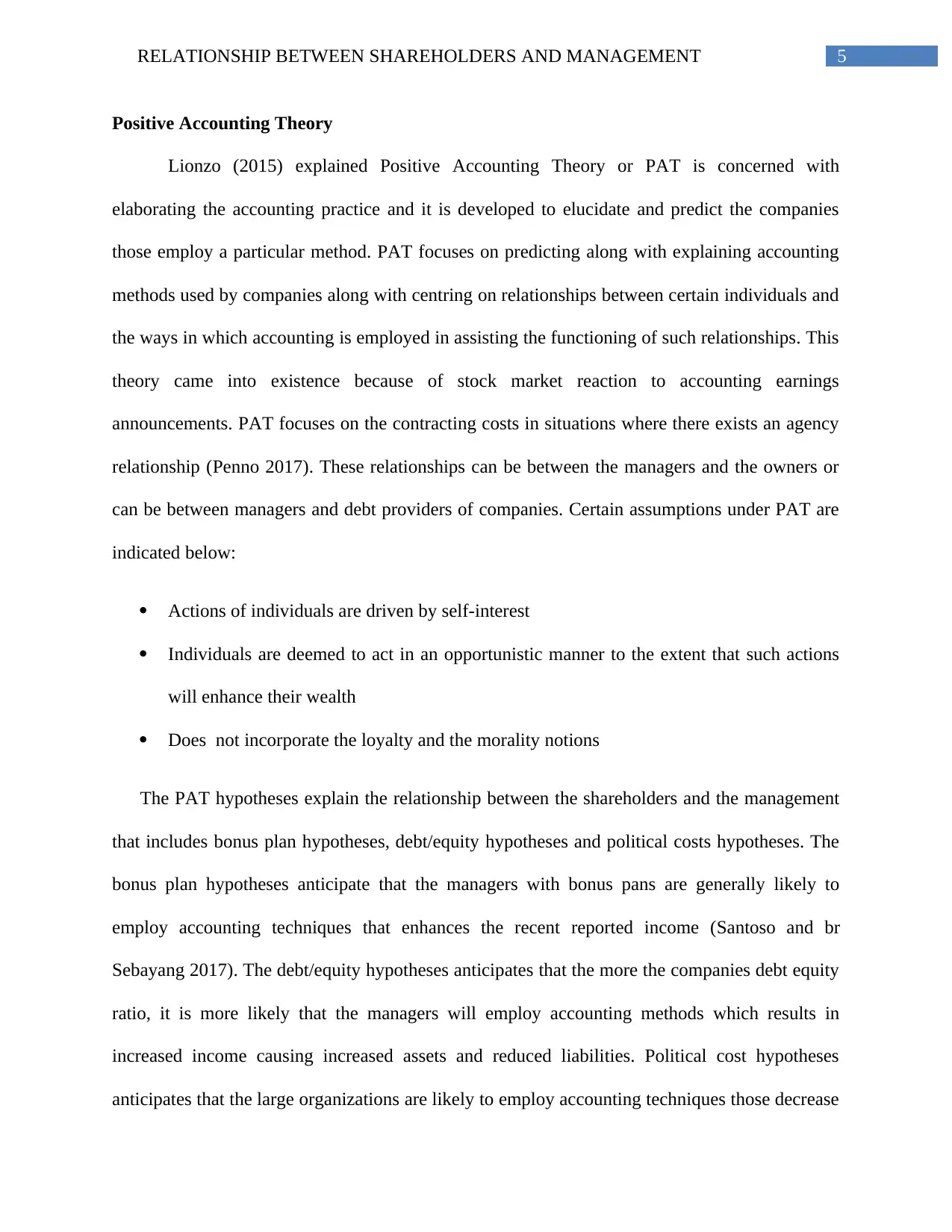
5RELATIONSHIP BETWEEN SHAREHOLDERS AND MANAGEMENT
Positive Accounting Theory
Lionzo (2015) explained Positive Accounting Theory or PAT is concerned with
elaborating the accounting practice and it is developed to elucidate and predict the companies
those employ a particular method. PAT focuses on predicting along with explaining accounting
methods used by companies along with centring on relationships between certain individuals and
the ways in which accounting is employed in assisting the functioning of such relationships. This
theory came into existence because of stock market reaction to accounting earnings
announcements. PAT focuses on the contracting costs in situations where there exists an agency
relationship (Penno 2017). These relationships can be between the managers and the owners or
can be between managers and debt providers of companies. Certain assumptions under PAT are
indicated below:
Actions of individuals are driven by self-interest
Individuals are deemed to act in an opportunistic manner to the extent that such actions
will enhance their wealth
Does not incorporate the loyalty and the morality notions
The PAT hypotheses explain the relationship between the shareholders and the management
that includes bonus plan hypotheses, debt/equity hypotheses and political costs hypotheses. The
bonus plan hypotheses anticipate that the managers with bonus pans are generally likely to
employ accounting techniques that enhances the recent reported income (Santoso and br
Sebayang 2017). The debt/equity hypotheses anticipates that the more the companies debt equity
ratio, it is more likely that the managers will employ accounting methods which results in
increased income causing increased assets and reduced liabilities. Political cost hypotheses
anticipates that the large organizations are likely to employ accounting techniques those decrease
Positive Accounting Theory
Lionzo (2015) explained Positive Accounting Theory or PAT is concerned with
elaborating the accounting practice and it is developed to elucidate and predict the companies
those employ a particular method. PAT focuses on predicting along with explaining accounting
methods used by companies along with centring on relationships between certain individuals and
the ways in which accounting is employed in assisting the functioning of such relationships. This
theory came into existence because of stock market reaction to accounting earnings
announcements. PAT focuses on the contracting costs in situations where there exists an agency
relationship (Penno 2017). These relationships can be between the managers and the owners or
can be between managers and debt providers of companies. Certain assumptions under PAT are
indicated below:
Actions of individuals are driven by self-interest
Individuals are deemed to act in an opportunistic manner to the extent that such actions
will enhance their wealth
Does not incorporate the loyalty and the morality notions
The PAT hypotheses explain the relationship between the shareholders and the management
that includes bonus plan hypotheses, debt/equity hypotheses and political costs hypotheses. The
bonus plan hypotheses anticipate that the managers with bonus pans are generally likely to
employ accounting techniques that enhances the recent reported income (Santoso and br
Sebayang 2017). The debt/equity hypotheses anticipates that the more the companies debt equity
ratio, it is more likely that the managers will employ accounting methods which results in
increased income causing increased assets and reduced liabilities. Political cost hypotheses
anticipates that the large organizations are likely to employ accounting techniques those decrease
⊘ This is a preview!⊘
Do you want full access?
Subscribe today to unlock all pages.

Trusted by 1+ million students worldwide
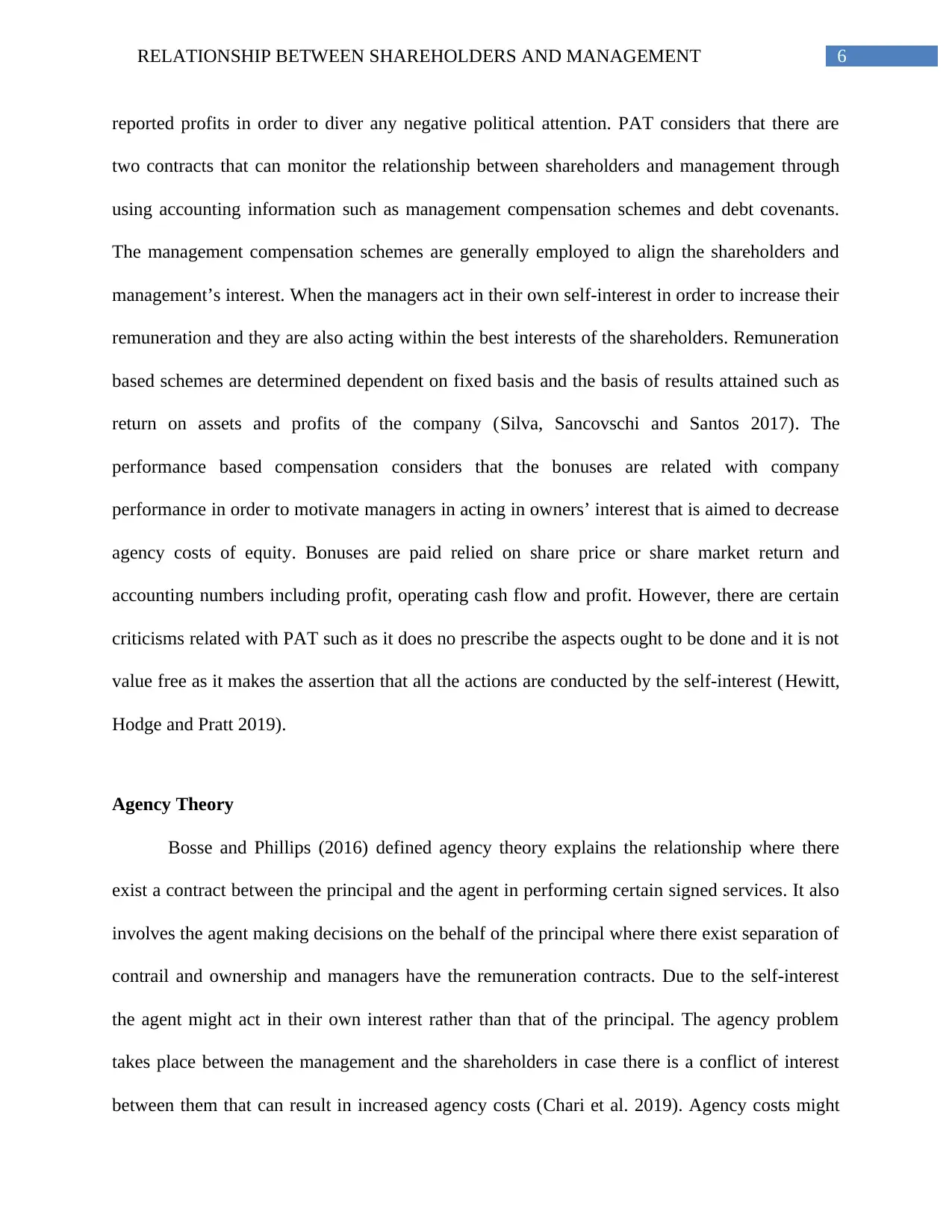
6RELATIONSHIP BETWEEN SHAREHOLDERS AND MANAGEMENT
reported profits in order to diver any negative political attention. PAT considers that there are
two contracts that can monitor the relationship between shareholders and management through
using accounting information such as management compensation schemes and debt covenants.
The management compensation schemes are generally employed to align the shareholders and
management’s interest. When the managers act in their own self-interest in order to increase their
remuneration and they are also acting within the best interests of the shareholders. Remuneration
based schemes are determined dependent on fixed basis and the basis of results attained such as
return on assets and profits of the company (Silva, Sancovschi and Santos 2017). The
performance based compensation considers that the bonuses are related with company
performance in order to motivate managers in acting in owners’ interest that is aimed to decrease
agency costs of equity. Bonuses are paid relied on share price or share market return and
accounting numbers including profit, operating cash flow and profit. However, there are certain
criticisms related with PAT such as it does no prescribe the aspects ought to be done and it is not
value free as it makes the assertion that all the actions are conducted by the self-interest (Hewitt,
Hodge and Pratt 2019).
Agency Theory
Bosse and Phillips (2016) defined agency theory explains the relationship where there
exist a contract between the principal and the agent in performing certain signed services. It also
involves the agent making decisions on the behalf of the principal where there exist separation of
contrail and ownership and managers have the remuneration contracts. Due to the self-interest
the agent might act in their own interest rather than that of the principal. The agency problem
takes place between the management and the shareholders in case there is a conflict of interest
between them that can result in increased agency costs (Chari et al. 2019). Agency costs might
reported profits in order to diver any negative political attention. PAT considers that there are
two contracts that can monitor the relationship between shareholders and management through
using accounting information such as management compensation schemes and debt covenants.
The management compensation schemes are generally employed to align the shareholders and
management’s interest. When the managers act in their own self-interest in order to increase their
remuneration and they are also acting within the best interests of the shareholders. Remuneration
based schemes are determined dependent on fixed basis and the basis of results attained such as
return on assets and profits of the company (Silva, Sancovschi and Santos 2017). The
performance based compensation considers that the bonuses are related with company
performance in order to motivate managers in acting in owners’ interest that is aimed to decrease
agency costs of equity. Bonuses are paid relied on share price or share market return and
accounting numbers including profit, operating cash flow and profit. However, there are certain
criticisms related with PAT such as it does no prescribe the aspects ought to be done and it is not
value free as it makes the assertion that all the actions are conducted by the self-interest (Hewitt,
Hodge and Pratt 2019).
Agency Theory
Bosse and Phillips (2016) defined agency theory explains the relationship where there
exist a contract between the principal and the agent in performing certain signed services. It also
involves the agent making decisions on the behalf of the principal where there exist separation of
contrail and ownership and managers have the remuneration contracts. Due to the self-interest
the agent might act in their own interest rather than that of the principal. The agency problem
takes place between the management and the shareholders in case there is a conflict of interest
between them that can result in increased agency costs (Chari et al. 2019). Agency costs might
Paraphrase This Document
Need a fresh take? Get an instant paraphrase of this document with our AI Paraphraser
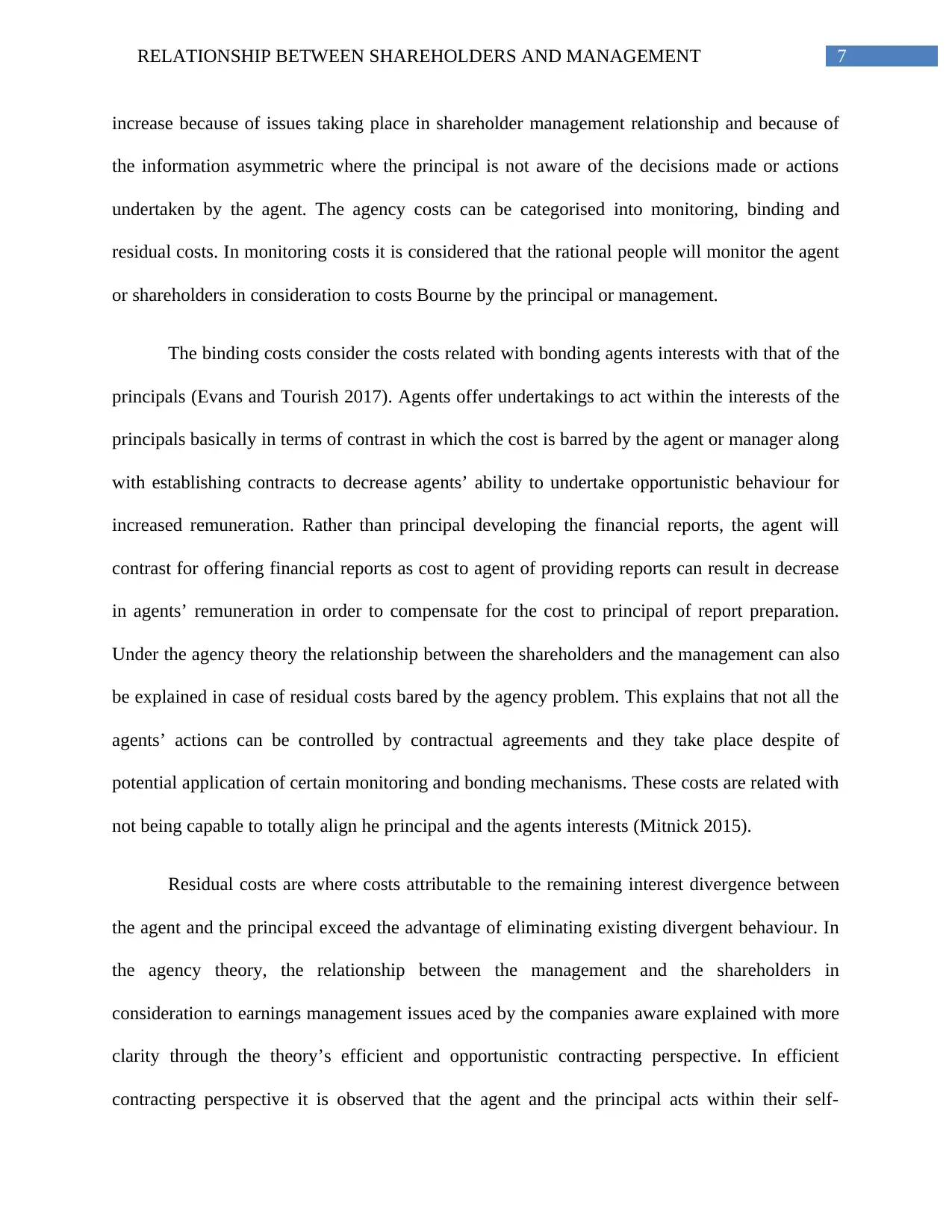
7RELATIONSHIP BETWEEN SHAREHOLDERS AND MANAGEMENT
increase because of issues taking place in shareholder management relationship and because of
the information asymmetric where the principal is not aware of the decisions made or actions
undertaken by the agent. The agency costs can be categorised into monitoring, binding and
residual costs. In monitoring costs it is considered that the rational people will monitor the agent
or shareholders in consideration to costs Bourne by the principal or management.
The binding costs consider the costs related with bonding agents interests with that of the
principals (Evans and Tourish 2017). Agents offer undertakings to act within the interests of the
principals basically in terms of contrast in which the cost is barred by the agent or manager along
with establishing contracts to decrease agents’ ability to undertake opportunistic behaviour for
increased remuneration. Rather than principal developing the financial reports, the agent will
contrast for offering financial reports as cost to agent of providing reports can result in decrease
in agents’ remuneration in order to compensate for the cost to principal of report preparation.
Under the agency theory the relationship between the shareholders and the management can also
be explained in case of residual costs bared by the agency problem. This explains that not all the
agents’ actions can be controlled by contractual agreements and they take place despite of
potential application of certain monitoring and bonding mechanisms. These costs are related with
not being capable to totally align he principal and the agents interests (Mitnick 2015).
Residual costs are where costs attributable to the remaining interest divergence between
the agent and the principal exceed the advantage of eliminating existing divergent behaviour. In
the agency theory, the relationship between the management and the shareholders in
consideration to earnings management issues aced by the companies aware explained with more
clarity through the theory’s efficient and opportunistic contracting perspective. In efficient
contracting perspective it is observed that the agent and the principal acts within their self-
increase because of issues taking place in shareholder management relationship and because of
the information asymmetric where the principal is not aware of the decisions made or actions
undertaken by the agent. The agency costs can be categorised into monitoring, binding and
residual costs. In monitoring costs it is considered that the rational people will monitor the agent
or shareholders in consideration to costs Bourne by the principal or management.
The binding costs consider the costs related with bonding agents interests with that of the
principals (Evans and Tourish 2017). Agents offer undertakings to act within the interests of the
principals basically in terms of contrast in which the cost is barred by the agent or manager along
with establishing contracts to decrease agents’ ability to undertake opportunistic behaviour for
increased remuneration. Rather than principal developing the financial reports, the agent will
contrast for offering financial reports as cost to agent of providing reports can result in decrease
in agents’ remuneration in order to compensate for the cost to principal of report preparation.
Under the agency theory the relationship between the shareholders and the management can also
be explained in case of residual costs bared by the agency problem. This explains that not all the
agents’ actions can be controlled by contractual agreements and they take place despite of
potential application of certain monitoring and bonding mechanisms. These costs are related with
not being capable to totally align he principal and the agents interests (Mitnick 2015).
Residual costs are where costs attributable to the remaining interest divergence between
the agent and the principal exceed the advantage of eliminating existing divergent behaviour. In
the agency theory, the relationship between the management and the shareholders in
consideration to earnings management issues aced by the companies aware explained with more
clarity through the theory’s efficient and opportunistic contracting perspective. In efficient
contracting perspective it is observed that the agent and the principal acts within their self-
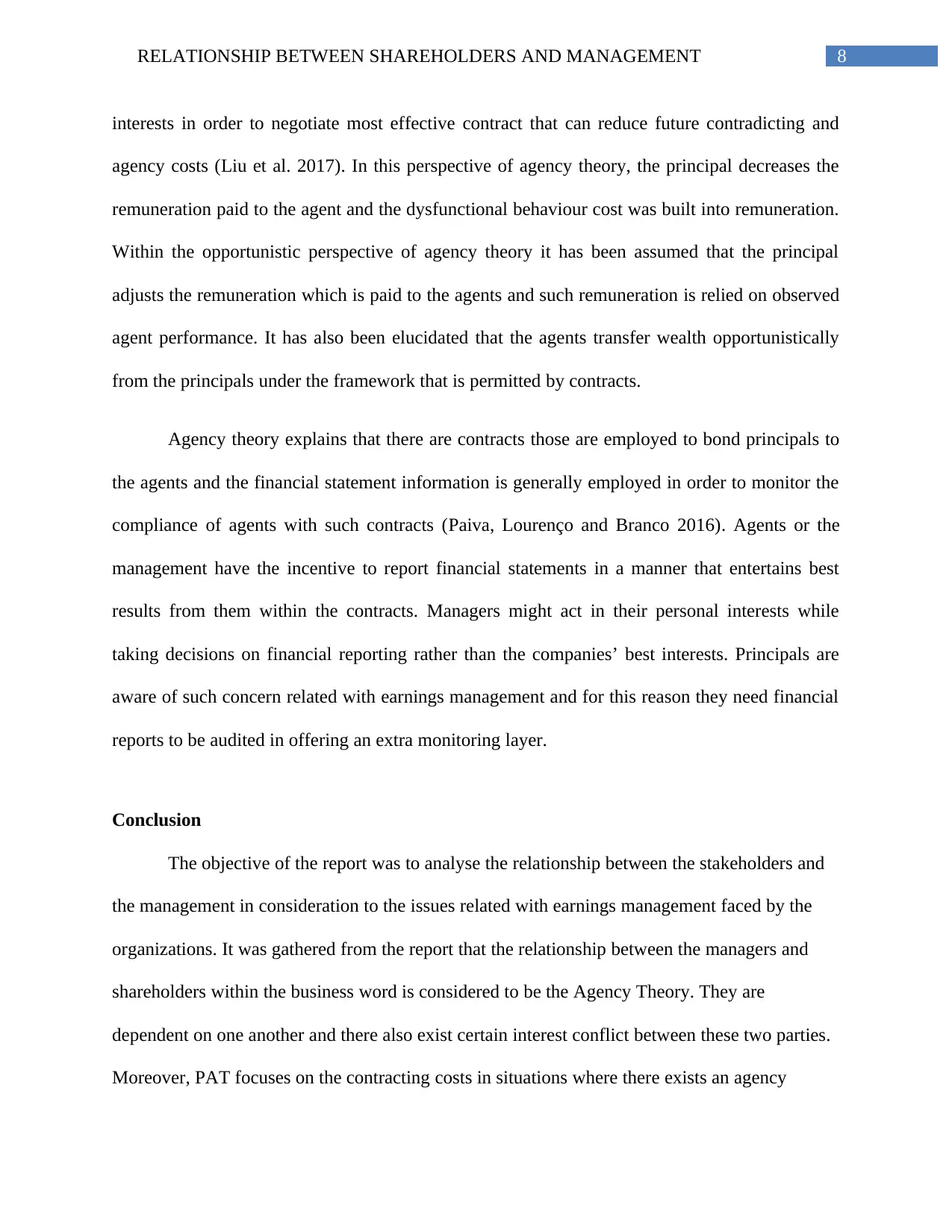
8RELATIONSHIP BETWEEN SHAREHOLDERS AND MANAGEMENT
interests in order to negotiate most effective contract that can reduce future contradicting and
agency costs (Liu et al. 2017). In this perspective of agency theory, the principal decreases the
remuneration paid to the agent and the dysfunctional behaviour cost was built into remuneration.
Within the opportunistic perspective of agency theory it has been assumed that the principal
adjusts the remuneration which is paid to the agents and such remuneration is relied on observed
agent performance. It has also been elucidated that the agents transfer wealth opportunistically
from the principals under the framework that is permitted by contracts.
Agency theory explains that there are contracts those are employed to bond principals to
the agents and the financial statement information is generally employed in order to monitor the
compliance of agents with such contracts (Paiva, Lourenço and Branco 2016). Agents or the
management have the incentive to report financial statements in a manner that entertains best
results from them within the contracts. Managers might act in their personal interests while
taking decisions on financial reporting rather than the companies’ best interests. Principals are
aware of such concern related with earnings management and for this reason they need financial
reports to be audited in offering an extra monitoring layer.
Conclusion
The objective of the report was to analyse the relationship between the stakeholders and
the management in consideration to the issues related with earnings management faced by the
organizations. It was gathered from the report that the relationship between the managers and
shareholders within the business word is considered to be the Agency Theory. They are
dependent on one another and there also exist certain interest conflict between these two parties.
Moreover, PAT focuses on the contracting costs in situations where there exists an agency
interests in order to negotiate most effective contract that can reduce future contradicting and
agency costs (Liu et al. 2017). In this perspective of agency theory, the principal decreases the
remuneration paid to the agent and the dysfunctional behaviour cost was built into remuneration.
Within the opportunistic perspective of agency theory it has been assumed that the principal
adjusts the remuneration which is paid to the agents and such remuneration is relied on observed
agent performance. It has also been elucidated that the agents transfer wealth opportunistically
from the principals under the framework that is permitted by contracts.
Agency theory explains that there are contracts those are employed to bond principals to
the agents and the financial statement information is generally employed in order to monitor the
compliance of agents with such contracts (Paiva, Lourenço and Branco 2016). Agents or the
management have the incentive to report financial statements in a manner that entertains best
results from them within the contracts. Managers might act in their personal interests while
taking decisions on financial reporting rather than the companies’ best interests. Principals are
aware of such concern related with earnings management and for this reason they need financial
reports to be audited in offering an extra monitoring layer.
Conclusion
The objective of the report was to analyse the relationship between the stakeholders and
the management in consideration to the issues related with earnings management faced by the
organizations. It was gathered from the report that the relationship between the managers and
shareholders within the business word is considered to be the Agency Theory. They are
dependent on one another and there also exist certain interest conflict between these two parties.
Moreover, PAT focuses on the contracting costs in situations where there exists an agency
⊘ This is a preview!⊘
Do you want full access?
Subscribe today to unlock all pages.

Trusted by 1+ million students worldwide
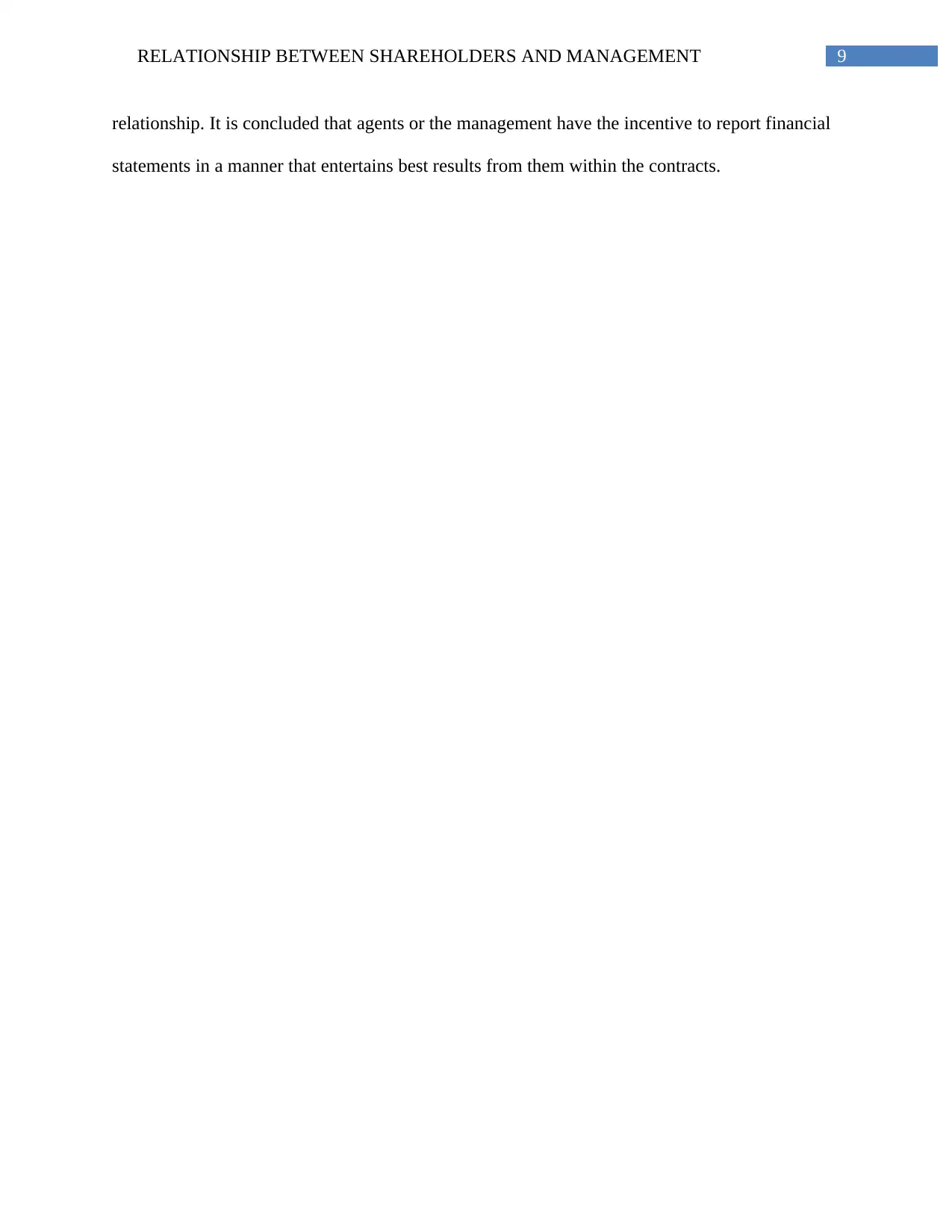
9RELATIONSHIP BETWEEN SHAREHOLDERS AND MANAGEMENT
relationship. It is concluded that agents or the management have the incentive to report financial
statements in a manner that entertains best results from them within the contracts.
relationship. It is concluded that agents or the management have the incentive to report financial
statements in a manner that entertains best results from them within the contracts.
Paraphrase This Document
Need a fresh take? Get an instant paraphrase of this document with our AI Paraphraser

10RELATIONSHIP BETWEEN SHAREHOLDERS AND MANAGEMENT
References
Almadi, M. and Lazic, P., 2016. CEO incentive compensation and earnings management: The
implications of institutions and governance systems. Management Decision, 54(10), pp.2447-
2461.
Bao, S.R. and Lewellyn, K.B., 2017. Ownership structure and earnings management in emerging
markets—An institutionalized agency perspective. International Business Review, 26(5), pp.828-
838.
Bosse, D.A. and Phillips, R.A., 2016. Agency theory and bounded self-interest. Academy of
Management Review, 41(2), pp.276-297.
Chari, M.D., David, P., Duru, A. and Zhao, Y., 2019. Bowman's risk-return paradox: An agency
theory perspective. Journal of Business Research, 95, pp.357-375.
Dhole, S., Manchiraju, H. and Suk, I., 2016. CEO inside debt and earnings management. Journal
of Accounting, Auditing & Finance, 31(4), pp.515-550.
Evans, S. and Tourish, D., 2017. Agency theory and performance appraisal: How bad theory
damages learning and contributes to bad management practice. Management Learning, 48(3),
pp.271-291.
Hewitt, M., Hodge, F.D. and Pratt, J.H., 2019. Do Shareholders Assess Managers’ Use of
Accruals to Manage Earnings as a Negative Signal of Trustworthiness Even When its Outcome
Serves Shareholders’ Interests?. Available at SSRN 2245204.
References
Almadi, M. and Lazic, P., 2016. CEO incentive compensation and earnings management: The
implications of institutions and governance systems. Management Decision, 54(10), pp.2447-
2461.
Bao, S.R. and Lewellyn, K.B., 2017. Ownership structure and earnings management in emerging
markets—An institutionalized agency perspective. International Business Review, 26(5), pp.828-
838.
Bosse, D.A. and Phillips, R.A., 2016. Agency theory and bounded self-interest. Academy of
Management Review, 41(2), pp.276-297.
Chari, M.D., David, P., Duru, A. and Zhao, Y., 2019. Bowman's risk-return paradox: An agency
theory perspective. Journal of Business Research, 95, pp.357-375.
Dhole, S., Manchiraju, H. and Suk, I., 2016. CEO inside debt and earnings management. Journal
of Accounting, Auditing & Finance, 31(4), pp.515-550.
Evans, S. and Tourish, D., 2017. Agency theory and performance appraisal: How bad theory
damages learning and contributes to bad management practice. Management Learning, 48(3),
pp.271-291.
Hewitt, M., Hodge, F.D. and Pratt, J.H., 2019. Do Shareholders Assess Managers’ Use of
Accruals to Manage Earnings as a Negative Signal of Trustworthiness Even When its Outcome
Serves Shareholders’ Interests?. Available at SSRN 2245204.
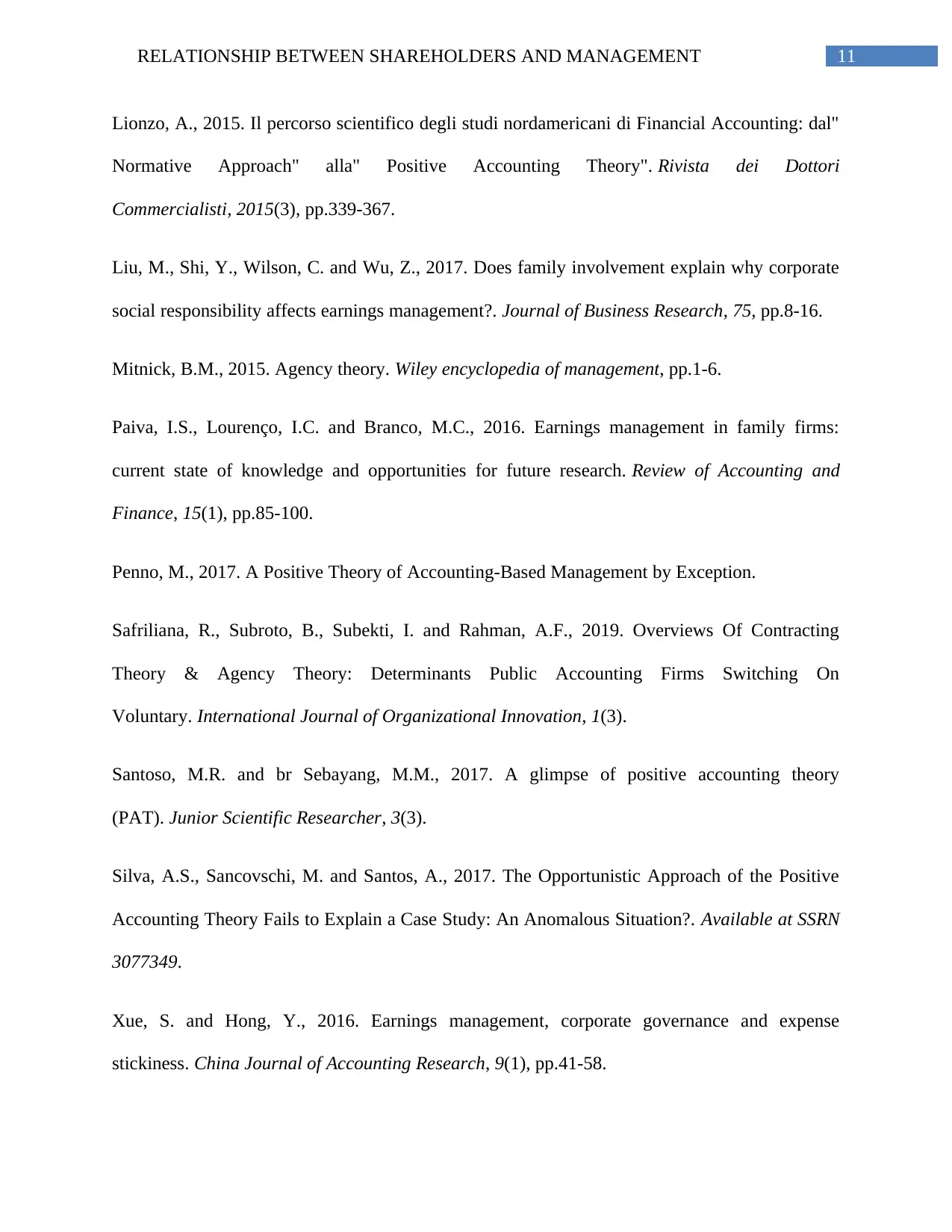
11RELATIONSHIP BETWEEN SHAREHOLDERS AND MANAGEMENT
Lionzo, A., 2015. Il percorso scientifico degli studi nordamericani di Financial Accounting: dal"
Normative Approach" alla" Positive Accounting Theory". Rivista dei Dottori
Commercialisti, 2015(3), pp.339-367.
Liu, M., Shi, Y., Wilson, C. and Wu, Z., 2017. Does family involvement explain why corporate
social responsibility affects earnings management?. Journal of Business Research, 75, pp.8-16.
Mitnick, B.M., 2015. Agency theory. Wiley encyclopedia of management, pp.1-6.
Paiva, I.S., Lourenço, I.C. and Branco, M.C., 2016. Earnings management in family firms:
current state of knowledge and opportunities for future research. Review of Accounting and
Finance, 15(1), pp.85-100.
Penno, M., 2017. A Positive Theory of Accounting-Based Management by Exception.
Safriliana, R., Subroto, B., Subekti, I. and Rahman, A.F., 2019. Overviews Of Contracting
Theory & Agency Theory: Determinants Public Accounting Firms Switching On
Voluntary. International Journal of Organizational Innovation, 1(3).
Santoso, M.R. and br Sebayang, M.M., 2017. A glimpse of positive accounting theory
(PAT). Junior Scientific Researcher, 3(3).
Silva, A.S., Sancovschi, M. and Santos, A., 2017. The Opportunistic Approach of the Positive
Accounting Theory Fails to Explain a Case Study: An Anomalous Situation?. Available at SSRN
3077349.
Xue, S. and Hong, Y., 2016. Earnings management, corporate governance and expense
stickiness. China Journal of Accounting Research, 9(1), pp.41-58.
Lionzo, A., 2015. Il percorso scientifico degli studi nordamericani di Financial Accounting: dal"
Normative Approach" alla" Positive Accounting Theory". Rivista dei Dottori
Commercialisti, 2015(3), pp.339-367.
Liu, M., Shi, Y., Wilson, C. and Wu, Z., 2017. Does family involvement explain why corporate
social responsibility affects earnings management?. Journal of Business Research, 75, pp.8-16.
Mitnick, B.M., 2015. Agency theory. Wiley encyclopedia of management, pp.1-6.
Paiva, I.S., Lourenço, I.C. and Branco, M.C., 2016. Earnings management in family firms:
current state of knowledge and opportunities for future research. Review of Accounting and
Finance, 15(1), pp.85-100.
Penno, M., 2017. A Positive Theory of Accounting-Based Management by Exception.
Safriliana, R., Subroto, B., Subekti, I. and Rahman, A.F., 2019. Overviews Of Contracting
Theory & Agency Theory: Determinants Public Accounting Firms Switching On
Voluntary. International Journal of Organizational Innovation, 1(3).
Santoso, M.R. and br Sebayang, M.M., 2017. A glimpse of positive accounting theory
(PAT). Junior Scientific Researcher, 3(3).
Silva, A.S., Sancovschi, M. and Santos, A., 2017. The Opportunistic Approach of the Positive
Accounting Theory Fails to Explain a Case Study: An Anomalous Situation?. Available at SSRN
3077349.
Xue, S. and Hong, Y., 2016. Earnings management, corporate governance and expense
stickiness. China Journal of Accounting Research, 9(1), pp.41-58.
⊘ This is a preview!⊘
Do you want full access?
Subscribe today to unlock all pages.

Trusted by 1+ million students worldwide
1 out of 12
Related Documents
Your All-in-One AI-Powered Toolkit for Academic Success.
+13062052269
info@desklib.com
Available 24*7 on WhatsApp / Email
![[object Object]](/_next/static/media/star-bottom.7253800d.svg)
Unlock your academic potential
Copyright © 2020–2026 A2Z Services. All Rights Reserved. Developed and managed by ZUCOL.




